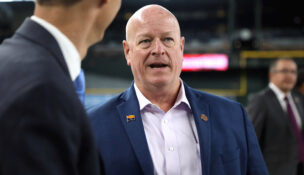Governors form innovation task force
Arizona Capitol Reports Staff//December 8, 2006//[read_meter]
Several state governors said the United States must change its culture to foster innovation in education and business to compete globally for high-paying jobs increasingly out of reach of many Americans.
“This is something we’ve got to get right,” Kansas Gov. Kathleen Sebelius said. “We don’t have the luxury of looking back 10 years from now.”
Ms. Sebelius joined Governor Napolitano and Minnesota Governor Tim Pawlenty on Dec. 5 as they opened a two-day conference in Phoenix to brainstorm ideas for inclusion in a plan to be presented to the full National Governors Association in February.
Ms. Napolitano made innovation the subject of her chief initiative for the association when she became the group’s chair earlier this year. The group announced the formation of a 17-member task force led by Ms. Napolitano and Mr. Pawlenty to spearhead the effort.
If innovation isn’t a top priority, “the next generation of Americans will suffer for it,” Ms. Napolitano said. “It is something that will make a big difference in the quality of life for the people that we represent.”
Mr. Pawlenty said it is relatively easy for states to upgrade curriculum and academic standards, but society as a whole needs to be more attuned to advances in science and math. “I would suggest the hard part is the cultural challenge,” he said.
That sort of change requires risk and sacrifice, said John Thompson, chairman and chief executive of Cupertino, Calif.-based software company, Symantec Corp.
Lengthening the school year so American students can better compete with their counterparts in other countries would mean shorter summer breaks for many teachers, less family time for parents and choices between competing budget priorities for government officials, Mr. Thompson said during an interview.
“That’s just one instance of a small change that we could make that represents a ripple of sacrifice throughout our economy,’’ he said.
While many strong-backed workers without much education could find jobs that paid moderately well as recently as two generations ago, such jobs are becoming increasingly scarce, Mr. Pawlenty said. “You can be marginalized in this economy in a hurry.”
With China and India transitioning from developing to consumer economies, the United States’ own size “isn’t going to be a difference-maker” in global economic competition any longer, Mr. Pawlenty said.
Approximately 150 government officials, educators and business executives, including teams from 35 states and Puerto Rico, are attending the conclave.
“Governors are uniquely capable of moving this agenda,” Ms. Sebelius said. “This is national policy being made in 50 states across the country. It has the ability to resonate from statehouse to statehouse.”
Copyright 2006 Associated Press. All rights reserved. This material may not be published, broadcast, rewritten or redistributed.

















